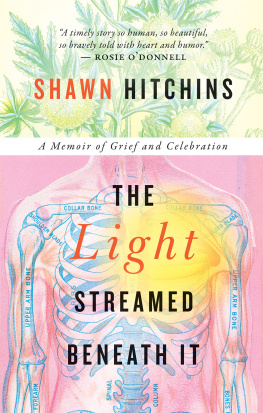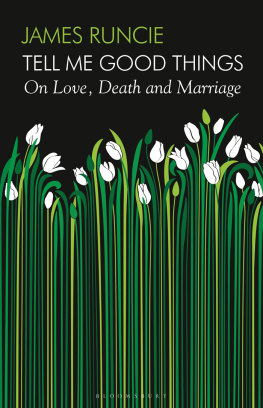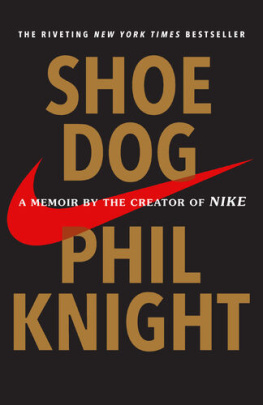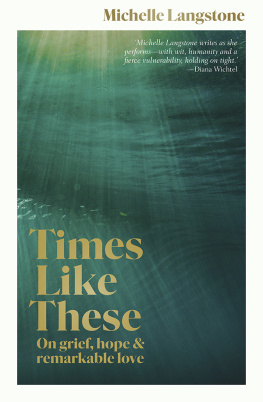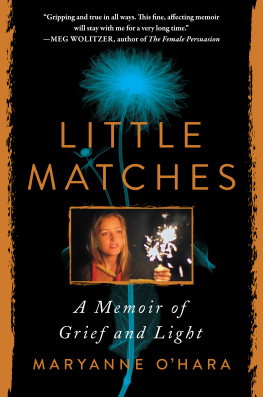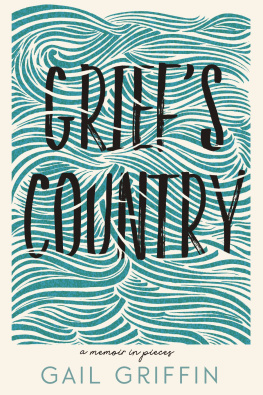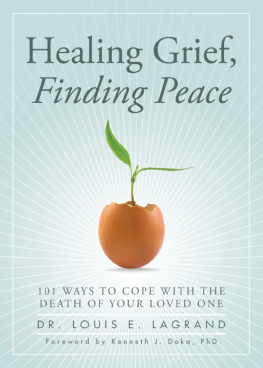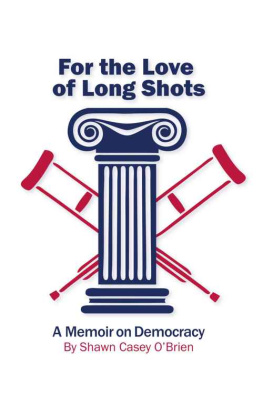My story and my loss intersect and collide with many others. We do not know emotional landscapes outside our own; we can only hold space for contrasting viewpoints. My testimony exists as a whole and as part of a greater whole. Ive taken care to refer to a few individuals by their archetypes, combine several individuals into one character, or respectfully omit them.
Part of my work in healing includes investigating traditions and rituals from cultures and religions outside of my ancestry. I enter these conversations with humility. I combine quiet study with firsthand practice. I listen to the wisdom of my teachers and the traditions of their ancestors. I hold these knowings with reverence, separate from myself, and do not confuse or represent them as my own.
Beginning
Marley was dead: to begin with.There is no doubt whatever about that.
Charles Dickens, A Christmas Carol
I am no Dickens, the master of both beginnings and endings. So Ill borrow an opening line from him. Matthew and David were dead: to begin with.
I sob every time I encounter A Christmas Carol, the tale of Ebenezer Scrooge and his holiday hauntings. I dont weep for Tiny Tim and his sacred catchphrase, God bless Us, Every One! I couldnt give a fig about Tiny Tim, but its full waterworks when Scrooge wakes up a changed man just in time for Christmas morning. The miser is granted something more precious than gold: he is granted time. His fears and regrets turn to joy and elation, and he is transformed. He moves forward embodying the spirit of the past, present, and future in equal measure. A junior school production of this scene featuring a prepubescent Scrooge wearing a cotton ball beard and a flannel dress would still make me bawl. This child could shout through a cardboard window, Whats to-day, my fine fellow? to a twill-cap-wearing fetus who answers, shredding a cockney accent, To-day! Why, CHRISTMAS DAY! and my ducts simply would not withstand the pressure.
My feelings have feelings.
Dickens created a character who wakes up in his own experience after an overnight process of psychoanalysis decades before Jung or Freud were even subconscious. I could liken Scrooges journey to a spiritual awakening, but his transformation is deeper, darker. He is chilled to his marrow in a direct confrontation with death. His return to aliveness is a journey through death, disease, humor, and trauma all baked in a jolly Victorian suet pudding.
I have witnessed horror, felt haunted, undergone intense therapy, and now I am awake. I, like Scrooge, am gifted precious time.
Matthew and David are dead: to begin with.
I repeat this fact to myself daily, over and over to carve new grooves in my brain. To accept this fresh reality. They were living, then they were not living. They lived, they died, and now their nicknames are permanently inked on my body. There is no doubt whatever about that. Matts exuberant ELBY! is etched in caps on my right wrist and Davids elegant cursive Shew is carved onto my left ribs. Their handwriting was lifted from love letters and transferred in fine black ink by the same gobsmacked tattoo artist who offered that all pain is temporary.
Its important for me to tell you now that they are dead, at the very beginning. Their deaths are not plot twists in a misery memoir, nor teasers or shiny lures for morbid curiosity. Their deaths are their own. I am not Matts accident, nor am I Davids death by suicide. Defining what is and is not personal in the wake of loss is the difficult work of grief especially when shame and anger enter the conversation.
What is personal are my individual relationships to these beautiful men and the thick connections that we formed. What is personal are the imprints left on me from coaching Matt to let go, from begging David to hold on. What is personal is being forced to wear an invisible dunce cap of grief that read impossibly sad for months and months and months. It is personal that I lost two great loves within five months of each other, and I emerged from this experience with an understanding that life is essentially good. It is certainly not fair but it is good. This is the point. Life is good.
And so here we are. You and I, entering this intimate conversation. Life is good.
I reread A Christmas Carol on a bright and sunny September day, in a Toronto park with maple trees full of green leaves not yet crisped by the fall air. Winter was the furthest thing from my thoughts. I love the simplicity of how Dickens draws characters, how he used the ancient values and rituals of Saturnalia (the Roman celebration of Saturn/Dionysus) to redefine Christmas for the masses; I love how he upheld the very Victorian ideal that the future can be altered; I love how death was indivisible from the day-to-day experience of Victorians. It was the first book that kept my attention, outside the canon of death literature that had arrived at my doorstep paired with casseroles. All those were essential reads, but not one included a road map back to the living like A Christmas Carol.
The time to learn about death is not just in the eye of a shitstorm of loss; death is also a conversation for still waters and blue skies. Death is an anytime conversation. Our fast-paced individualist lifestyles, weakened community ties, and rejection of theology have left us ill-prepared for the most significant event of our existence next to our births. We dont know how to incorporate death and dying into our day-to-day lives, to sit with our grief. Death has been ushered to the shadows. When tragedy strikes, we fall back on cultural norms and restrained mourning to streamline or bypass any pain. There is vital data in our discomfort and pain, information that can heal ourselves, heal communities.
This story is my path back to aliveness. This story is both an elegy of my body and a ballad for two dynamic men who changed my life two men who suddenly vanished.
My glaciers are melting. Glaciers, that is what Matt and David were to me, formed layer by layer with edges both smooth and rough, dignified in length, width, and depth, and created (as it felt to me) by some greater design. They are melting away. It is evaporation, compression, and recession that reduces a slow-moving river of ice into a watery till of rocks, sand, and clay. Grief is collapse. Its the suspended details of a life that were once held and co-supported suddenly crashing to the earth; it is the rubble of evidence, the knickknacks, T-shirts, birthday cards, and photos. Its the loss of a language. Its the transformation of complicated individuals into saints stripped of sexuality. Its intimate stories without a corroborating witness, inside jokes without a playful collaborator. I feel an urgency to capture these loves before they disappear, to chart their vastness with the wonder of an astronomer, map their intricacies with the curiosity of an anthropologist, and capture their magic with the awe of a mystic.

